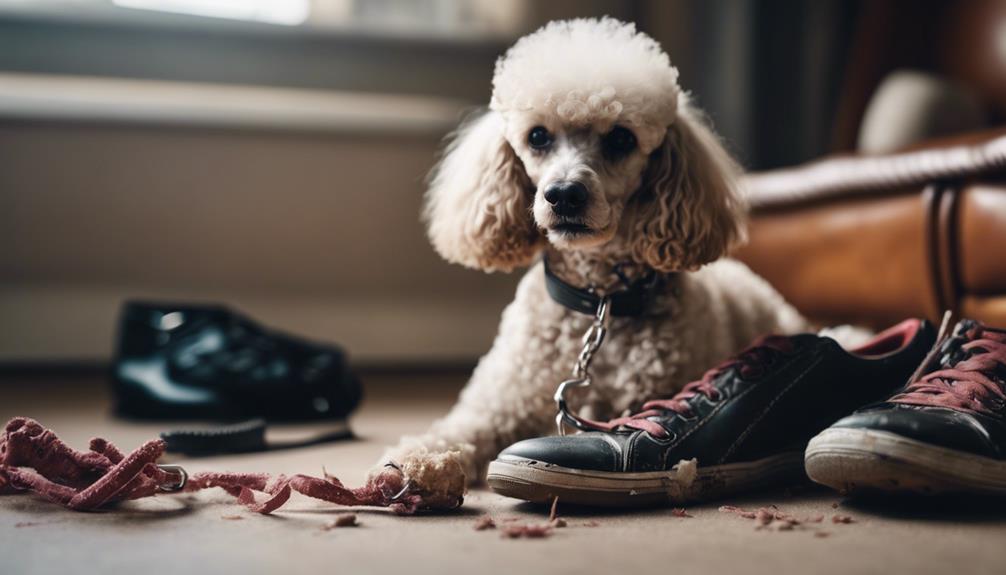When considering behavioral issues in Poodles, did you know that according to a recent survey, over 60% of Poodle owners cite barking as a common concern? Understanding the underlying reasons behind this behavior is essential in addressing it effectively. By exploring strategies to manage excessive barking, you can create a harmonious relationship with your Poodle and enhance their overall well-being.
Key Takeaways
- Use positive reinforcement to address Poodle barking effectively.
- Combat separation anxiety with gradual adjustments and interactive toys.
- Reinforce sitting to curb jumping behavior in Poodles.
- Provide appropriate toys and training to address chewing habits.
Poodle Behavior Challenges Overview

If you're a Poodle owner navigating behavior challenges, understanding the unique traits and tendencies of these intelligent dogs is key. Poodles, known for their emotional expressiveness and intelligence, may exhibit a range of behaviors like jumping, growling, marking, coprophagia, and begging. These behaviors can pose challenges for owners, requiring patience and consistent training. Training difficulties with Poodles often stem from their independent nature and distinctive personalities. To address behavior issues effectively, it's essential to recognize and correct undesirable habits such as chewing, licking, and humping. Poodles thrive on companionship and play, making it vital to provide them with mental stimulation and social interaction. Additionally, addressing Poodle behavior at different life stages is crucial for successful care and management of behavioral issues. By understanding your Poodle's behavior and providing appropriate training and enrichment, you can cultivate a harmonious relationship with your furry companion.
Understanding Poodle Barking

Understanding why Poodles bark is essential for effective training and communication with your furry companion. Poodles bark to express various needs like alerting, anxiety, playfulness, or seeking attention. Excessive barking could signal underlying issues such as boredom, fear, or separation anxiety in Poodles. Identifying what triggers your Poodle's barking behavior is crucial for successful training. Positive reinforcement techniques can be effective in reducing excessive barking. By rewarding desired behavior, you can encourage your Poodle to bark less in situations where it tends to bark excessively. Seeking guidance from a professional trainer or behaviorist can provide personalized strategies to manage your Poodle's barking behavior effectively. Remember, addressing excessive barking not only enhances your bond with your Poodle but also ensures a harmonious living environment for both of you. Stay patient and consistent in your training efforts to help your Poodle overcome excessive barking tendencies.
Dealing With Poodle Separation Anxiety
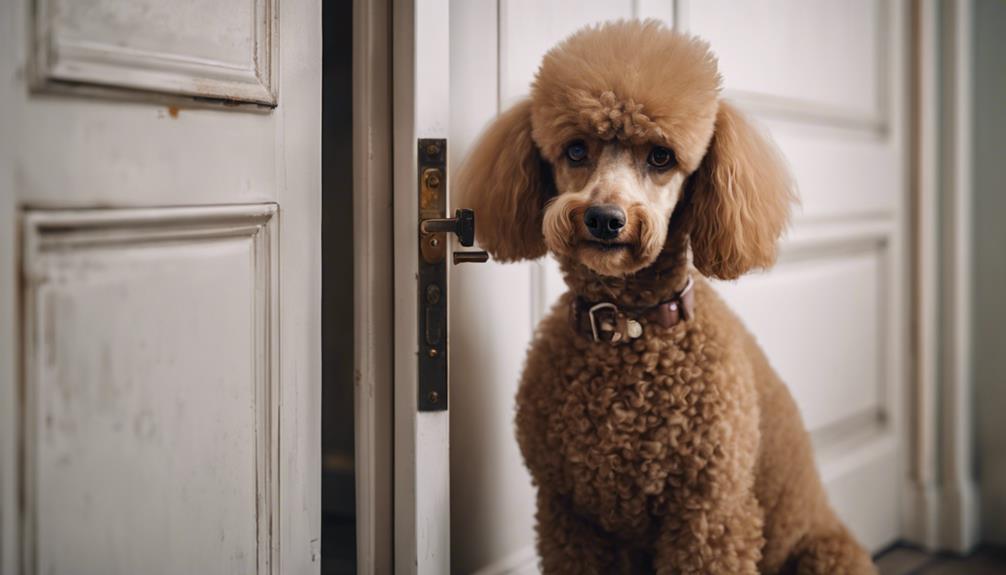
Dealing with Poodle Separation Anxiety can be challenging, but with the right strategies, you can help your furry friend cope better when left alone. Separation anxiety in Poodles may lead to vocalization, destructive behavior, and visible distress when they are separated from their owners. To address this issue, behavior modification techniques are key. Training your Poodle to feel comfortable being alone for short periods and gradually increasing the time apart can help them adjust.
Interactive toys and mental stimulation can also alleviate separation anxiety symptoms by keeping your Poodle occupied in your absence. When leaving or returning home, practicing low-key entrances and exits can help your Poodle feel more at ease. In severe cases, seeking guidance from a professional trainer or behaviorist is advisable to develop a tailored plan. Remember, patience and consistency are crucial in helping your Poodle overcome separation anxiety and feel more secure when you're not around.
Curbing Poodle Jumping Behavior

To address Poodle jumping behavior, consistent training and reinforcement are essential in redirecting their excitement or greeting behavior towards a more appropriate response, such as sitting. Jumping is a common behavior in Poodles, often displayed when they are excited or trying to greet you. By engaging in training sessions that focus on teaching your Poodle to sit instead of jump, you can effectively manage this behavior. Consistency is key; make sure to reinforce the sitting behavior every time your Poodle greets you or gets excited. Ignoring the jumping and rewarding calm behavior can also help discourage jumping up. Positive reinforcement techniques, such as giving treats or praise when your Poodle sits instead of jumps, can be very effective in redirecting their behavior. Remember, patience and persistence in training are crucial, but with time and effort, you can successfully curb your Poodle's jumping habits.
Addressing Poodle Chewing Habits

When it comes to addressing Poodle chewing habits, providing appropriate chew toys and bones is key to redirecting their behavior. Poodles may chew due to teething as puppies or to relieve stress and boredom as adults. By offering a variety of chew toys designed for dogs, you can help satisfy their natural urge to chew while also protecting your belongings. It's important to supervise your Poodle when they are chewing and consistently train them to understand which items are appropriate for chewing.
Training plays a vital role in discouraging destructive chewing in Poodles. By teaching them what is acceptable to chew on and praising them when they chew on the right items, you can help shape their behavior positively. Remember, chewing is a natural behavior for dogs, so providing the right outlets through chew toys and bones is essential for their overall well-being. Understanding the root cause of chewing, whether it's teething, boredom, or stress, can help you address and manage this behavior effectively.
Training Tips for Poodle Aggression

If your Poodle exhibits signs of aggression, understanding the root causes and implementing appropriate training techniques is crucial for fostering a harmonious relationship. Aggressive behavior in Poodles can stem from various factors such as fear, territorial behavior, or possessiveness. To address this issue effectively, consider the following tips:
- Desensitization and Counterconditioning: These techniques involve gradually exposing your Poodle to the triggers of aggression in a controlled and positive manner, paired with rewards to change their response.
- Professional Guidance: Seeking assistance from a certified dog trainer or behaviorist can provide you with expert advice tailored to your Poodle's specific aggression issues.
- Consistent Training and Positive Reinforcement: Consistency in training, positive reinforcement for good behavior, and clear communication can help in managing and modifying aggressive tendencies in your Poodle.
Handling Poodle Begging Behavior

Dealing with Poodle begging behavior requires consistent training and positive reinforcement techniques to modify this learned behavior effectively. When your dog stares, whines, or paws for attention or food, it can be challenging to resist giving in. However, helping your Poodle overcome this habit is essential for a harmonious relationship. Ignoring the begging and offering alternative activities or rewards can deter this behavior. Establishing a set mealtime routine and using commands like 'place' or 'stay' can also assist in reducing begging tendencies. Engaging in training sessions that focus on impulse control and patience will aid in addressing and modifying begging behavior in Poodles effectively. Remember, with patience and persistence, you can help your dog learn that begging is not the way to get what they want. By consistently applying these techniques, you can guide your Poodle towards more desirable behaviors and strengthen the bond between you both.
Preventing Poodle Digging Issues
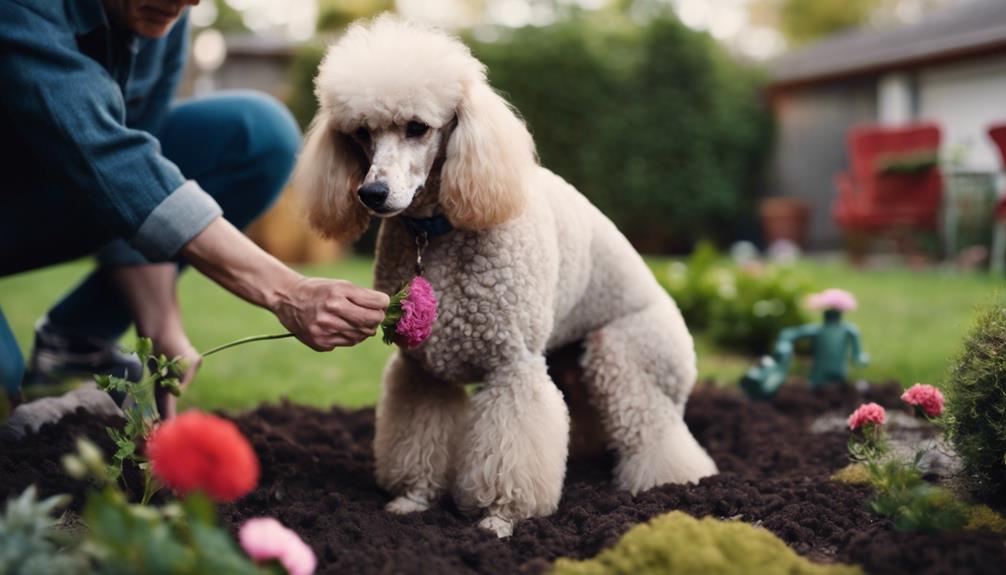
To prevent Poodle digging issues, provide your furry friend with engaging toys and mental stimulation to keep them entertained and deter excessive digging. Poodles may dig due to various reasons like boredom, hunting instincts, or seeking cool spots on hot days. Here are some tips to help curb this behavior:
- Interactive Toys: Offering toys that require problem-solving or provide treats can keep your Poodle mentally stimulated, reducing the likelihood of them digging out of boredom.
- Designated Digging Area: Create a specific spot in your yard where your Poodle is encouraged to dig. Bury toys or treats in this area to attract them to dig there instead of other places.
- Supervision and Redirection: Keep an eye on your Poodle while they are outside and redirect their digging to the designated area. Consistent training and positive reinforcement can help them understand where it's appropriate to dig.
Correcting Poodle Leash Pulling
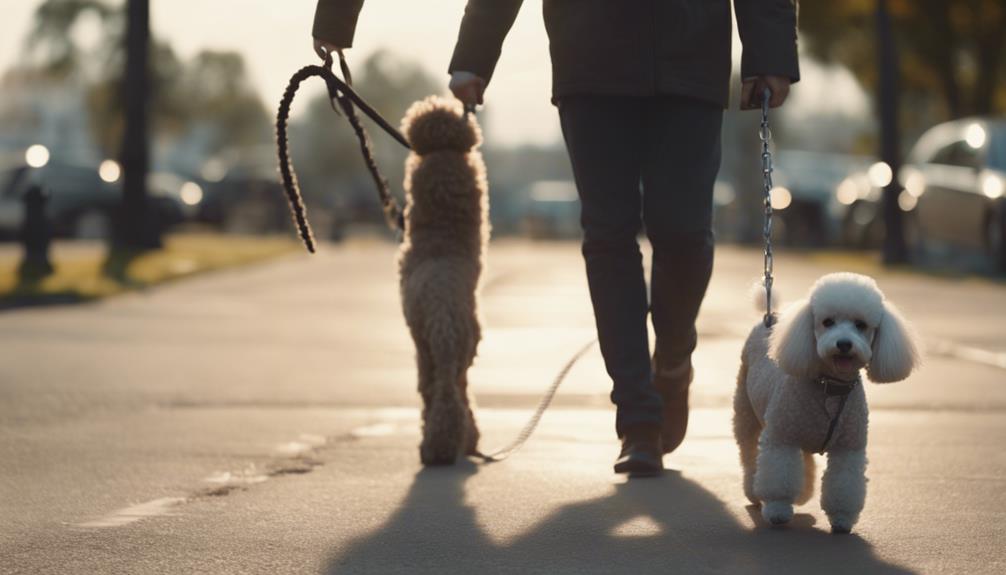
Correct leash pulling in Poodles by consistently training and positively reinforcing loose leash walking behaviors. Start by rewarding your Poodle for walking calmly beside you, teaching them the desired behavior. To further discourage pulling, consider using a front-clip harness or head halter. These tools can help redirect your Poodle's focus back to walking beside you. Begin practicing leash training in environments with fewer distractions before moving on to busier areas. If your Poodle continues to pull on the leash despite your efforts, it may be beneficial to consult with a professional dog trainer for additional guidance and support.
| Leash Pulling Tips for Poodles | ||
|---|---|---|
| Training Method | Tools | Training Environment |
| Consistent positive reinforcement | Front-clip harness | Start in low-distraction areas |
| Reward calm walking behavior | Head halter | Progress to busier settings |
Managing Poodle Counter Surfing

If your Poodle has a habit of counter surfing, you're not alone. To manage this behavior effectively, focus on training for prevention and redirecting attention. By keeping counters clear and using commands like 'leave it,' you can help discourage this behavior in your Poodle.
Training for Prevention
When addressing counter surfing behavior in your Poodle, focus on training the 'leave it' command as a key preventive measure. Poodles may engage in this bad behavior due to curiosity, seeking food, or attention. To help prevent counter surfing, consider the following:
- Supervise your Poodle closely when around food or tempting items.
- Teach and reinforce the 'leave it' command consistently during training sessions.
- Provide mental stimulation and interactive toys to keep your Poodle engaged and distracted from counters.
Redirecting Attention Effectively
To effectively manage and redirect your Poodle's counter surfing behavior, focus on consistently reinforcing the 'leave it' and 'off' commands to redirect their attention away from counters. Using positive reinforcement techniques such as treats or toys can help your dog understand what behaviors are desired. Additionally, ensuring that counters are clear of tempting items will prevent the reinforcement of counter surfing behavior. Consistent training and supervision are key in effectively managing and redirecting Poodle counter surfing. By implementing these strategies, you can help your dog learn to stop barking and focus their attention on appropriate activities.
| Tips to Redirect Attention Effectively |
|---|
| Reinforce 'leave it' and 'off' commands consistently |
| Use positive reinforcement like treats or toys |
| Keep counters clear of tempting items |
Solutions for Poodle Nipping
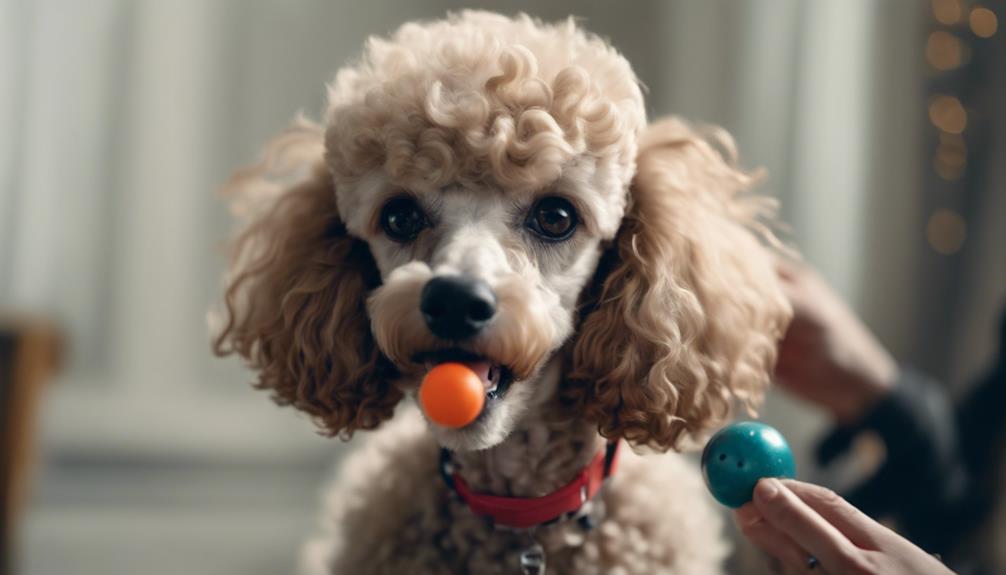
For managing Poodle nipping behavior, providing appropriate chew toys and consistent training are crucial steps to discourage this common puppy behavior. Poodle nipping is often a result of teething and exploration, but with the right approach, you can help your furry friend overcome this habit effectively. Here are some solutions for managing Poodle nipping:
- Chew Toys: Offering your Poodle a variety of safe and durable chew toys can redirect their nipping behavior onto appropriate items.
- Consistent Training: Implementing consistent training sessions with positive reinforcement can teach your dog that nipping is not acceptable.
- Socialization: Allowing your Poodle to socialize with other dogs and people can help reduce nipping tendencies and provide them with alternative ways to interact.
Discouraging Poodle Resource Guarding

If your Poodle displays resource guarding behaviors, such as growling over food or toys, it's essential to address this issue promptly. By teaching commands like 'drop it' and 'leave it' early on, you can discourage resource guarding tendencies in your Poodle. Seeking professional help may be necessary if resource guarding escalates to aggressive behavior.
Preventing Food Aggression
Preventing food aggression in Poodles involves early training and consistent reinforcement to discourage resource guarding behaviors. To help your Poodle overcome food aggression, consider the following:
- Begin Training Early: Start teaching your Poodle basic commands like 'drop it' and 'leave it' from a young age.
- Use Positive Reinforcement: Reward good behavior with treats, praise, and affection to create a positive association with sharing.
- Seek Professional Help: In severe cases of food aggression, consult a professional trainer or behaviorist for specialized guidance and support.
Managing Toy Possessiveness
When managing toy possessiveness in your Poodle, focus on positive reinforcement training techniques to discourage resource guarding behaviors effectively. Poodle resource guarding can present as possessiveness over toys or other items. Early training and socialization play a crucial role in preventing resource guarding behaviors. Utilize commands like 'drop it' or 'leave it' to manage and discourage resource guarding. Positive reinforcement training involves rewarding good behavior to reinforce positive habits. If resource guarding escalates or becomes aggressive, seek professional help promptly. Consistency and patience are key when addressing resource guarding in your Poodle. By employing positive reinforcement techniques and seeking assistance when needed, you can effectively manage and diminish toy possessiveness in your beloved pet.
Overcoming Poodle Fear Aggression

To effectively address and overcome fear aggression in Poodles, understanding the root causes is crucial. Fear aggression in Poodles stems from a defensive response to perceived threats, often triggered by fear or anxiety. To help your Poodle overcome fear aggression, consider the following:
- Early socialization: Exposing your Poodle to various people, animals, and environments from a young age can help prevent fear aggression by building confidence and reducing anxiety.
- Positive experiences: Ensuring that your Poodle has positive interactions and experiences with people, animals, and situations can help create a sense of safety and security, reducing fear-based responses.
- Professional help: Seeking guidance from a professional dog behaviorist or trainer who specializes in fear aggression can provide you with effective behavior modification techniques tailored to your Poodle's specific needs.
Resolving Poodle Territorial Behavior
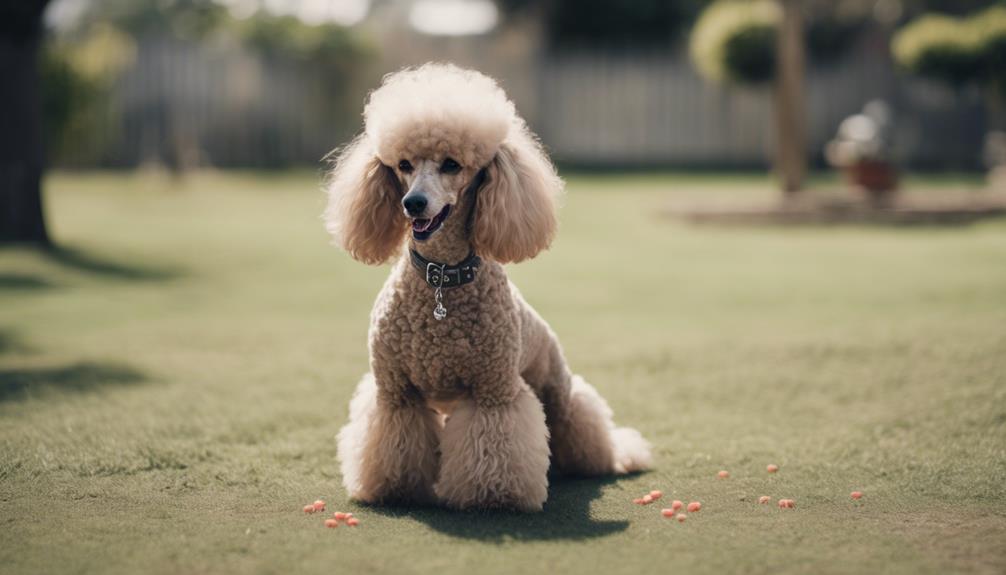
If you notice your Poodle showing territorial behavior, remember that setting clear boundaries at home is crucial. Encourage positive reinforcement training methods to help your Poodle understand acceptable behavior. Redirecting their territorial instincts towards more suitable activities can also aid in resolving this behavior.
Establishing Boundaries at Home
Establishing clear boundaries at home is key to resolving territorial behavior in Poodles. When dealing with territorial behavior in your Poodle, consider the following:
- Consistent Rules: Ensure everyone in the household follows the same rules to provide a structured environment for your Poodle.
- Designated Spaces: Create specific areas for your Poodle to feel secure without feeling the need to defend the entire home.
- Proper Supervision: Monitor interactions to intervene and redirect any territorial displays promptly.
Positive Reinforcement Training
When addressing territorial behavior in your Poodle, implementing positive reinforcement training can be highly effective in promoting desired behaviors and fostering a harmonious relationship with your pet. Positive reinforcement training involves rewarding your Poodle with treats or praise when they display the behaviors you desire, such as calm and non-aggressive responses in territorial situations. This method helps your Poodle associate positive outcomes with appropriate territorial behaviors. Consistency is key when using positive reinforcement, as it can effectively modify your Poodle's territorial tendencies over time. Remember to avoid punishment or harsh methods, as these can lead to distrust and damage the positive bond between you and your Poodle. By using positive reinforcement training, you can guide your Poodle towards more desirable behaviors and create a peaceful environment for both of you.
Redirecting Territorial Instincts
To effectively redirect your Poodle's territorial instincts, focus on positive socialization experiences with strangers to help diminish their protective behavior tendencies. This process can help your Poodle learn that not all visitors pose a threat, reducing the need for territorial behavior. In addition to socialization, obedience training plays a crucial role in establishing boundaries and reinforcing acceptable behaviors. By consistently practicing obedience commands, you can guide your Poodle to respond appropriately in various situations, including territorial ones. Addressing territorial aggression promptly is essential to prevent escalation and ensure a safe environment for everyone involved. Seeking guidance from professional trainers or behaviorists can provide you with effective management strategies tailored to your Poodle's specific needs.
- Socialize your Poodle with strangers in a positive manner.
- Implement obedience training to establish boundaries.
- Address territorial aggression promptly to prevent escalation.
Tips for Poodle Socialization Success
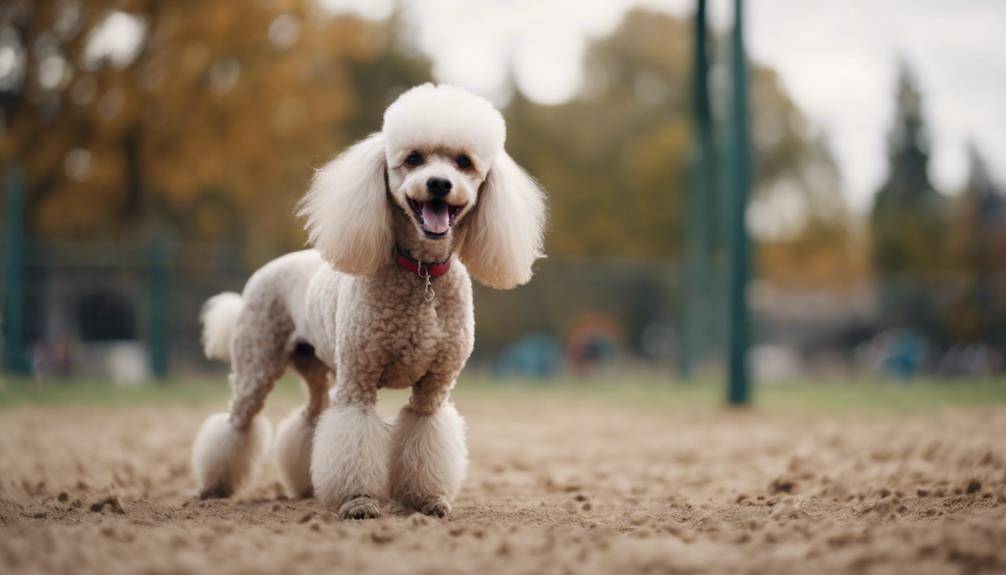
Begin introducing your Poodle to new experiences and environments early on to set a solid foundation for socialization success. Socialization is crucial for Poodles to develop positive interactions with people, animals, and environments. Ideally, start between 3 to 14 weeks of age to build a confident and well-adjusted Poodle. To help with socialization, expose your Poodle to various stimuli like different sounds, surfaces, people, and animals. This exposure can prevent fear or aggression later on. Positive experiences during socialization can help your Poodle become more adaptable and relaxed in new situations. Remember, regular socialization throughout your Poodle's life can maintain good behavior and prevent issues like fearfulness or aggression. By implementing these tips to help with socialization, you are investing in your Poodle's well-being and creating a happy, well-adjusted companion for years to come.
Frequently Asked Questions
What Is the Best Method of Dealing With a Dog's Behavioral Issues?
To effectively address a dog's behavioral issues, focus on positive reinforcement and behavior modification. Consistent training with clear boundaries is key. Seek guidance from professionals for tailored solutions. Understanding the root cause is crucial. Be patient and persistent.
How Do You Discipline a Poodle?
When disciplining a Poodle, use positive reinforcement and consistency. Reward good behavior with treats and praise. Avoid harsh methods that can cause fear or aggression. Redirect unwanted behaviors with appropriate toys or commands.
What Are Destructive Behaviors in Poodles?
When dealing with destructive behaviors in Poodles, remember that addressing separation anxiety and redirecting chewing problems can make a significant difference. Consistent training and providing appropriate mental stimulation are key to curbing these issues effectively.
How Do You Address a Bad Behavior in a Dog?
To address bad behavior in a dog, focus on positive reinforcement and consistent training techniques. Behavioral modification and obedience training are crucial. Seek professional help if needed. Early intervention can prevent habits from forming.
Conclusion
You've learned valuable tips for addressing common behavioral issues in your Poodle. Just like a symphony conductor guiding musicians to harmonize, you can lead your Poodle to better behavior with patience and consistency. By understanding their unique characteristics and tendencies, you can create a harmonious relationship with your furry companion. Keep practicing positive reinforcement and clear communication to conduct a beautiful melody of well-behaved Poodle behavior.
